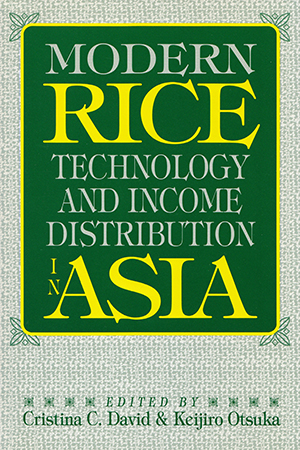Two decades have passed since the introduction of modern rice varieties (MVs) and their accompanying technology in Asia. This volume looks at seven Asian countries—with widely diverse production environments and agrarian and policy structures—to determine to what extent the adoption of MVs only in the irrigated and the favorable rainfed-lowland areas has exacerbated inequalities in the distribution of income.
Refuting claims of Green Revolution critics, the contributors find that, when both direct and indirect effects of labor, land, and market adjustments are considered, differential adoption of MVs across environments did not significantly worsen income distribution. Instead, as MV adoption increased the demand for labor in the favorable areas, interregional migration from unfavorable areas occurred, largely equalizing wages. And unfavorable areas mitigated potentially negative impacts by changing farm size and shifting to alternative crops or to nonfarm employment.
Cristina David is research fellow at the Philippine Institute for Development Studies. Keijiro Otsuka is professor of economics, Tokyo Metropolitan University, and currently a visiting research fellow at the International Food Policy Research Institute. Both editors were formerly on the staff at the International Rice Research Institute (IRRI), where they coordinated the research project on which this book is based.
"Modern Rice Technology and Income Distribution in Asia constitutes an important event.... The rigor of the authors' analysis and the variety of thoroughly examined situations contribute important new information."—Jean Chataigner, Food and Foodways
"Must be considered among the most authoritative works available about the Green Revolution."—Journal of Developing Areas
"Controversy still surrounds the issue of income distribution and the Green Revolution. Modern Rice Technology and Income Distribution in Asia represents a new and highly significant contribution to this twenty-five-year-old debate.... A book that will be read and discussed by many specialists in the field. The overarching analytical framework, in-depth country studies, and extensive list of references make it a classic volume."—The Journal of Asian Studies
"The first systematic, multi-country effort to collect and analyze data to assess the impact of the Green Revolution.... The most comprehensive assessment of the impact of the Green Revolution in Asia."—Richard Bernsten








